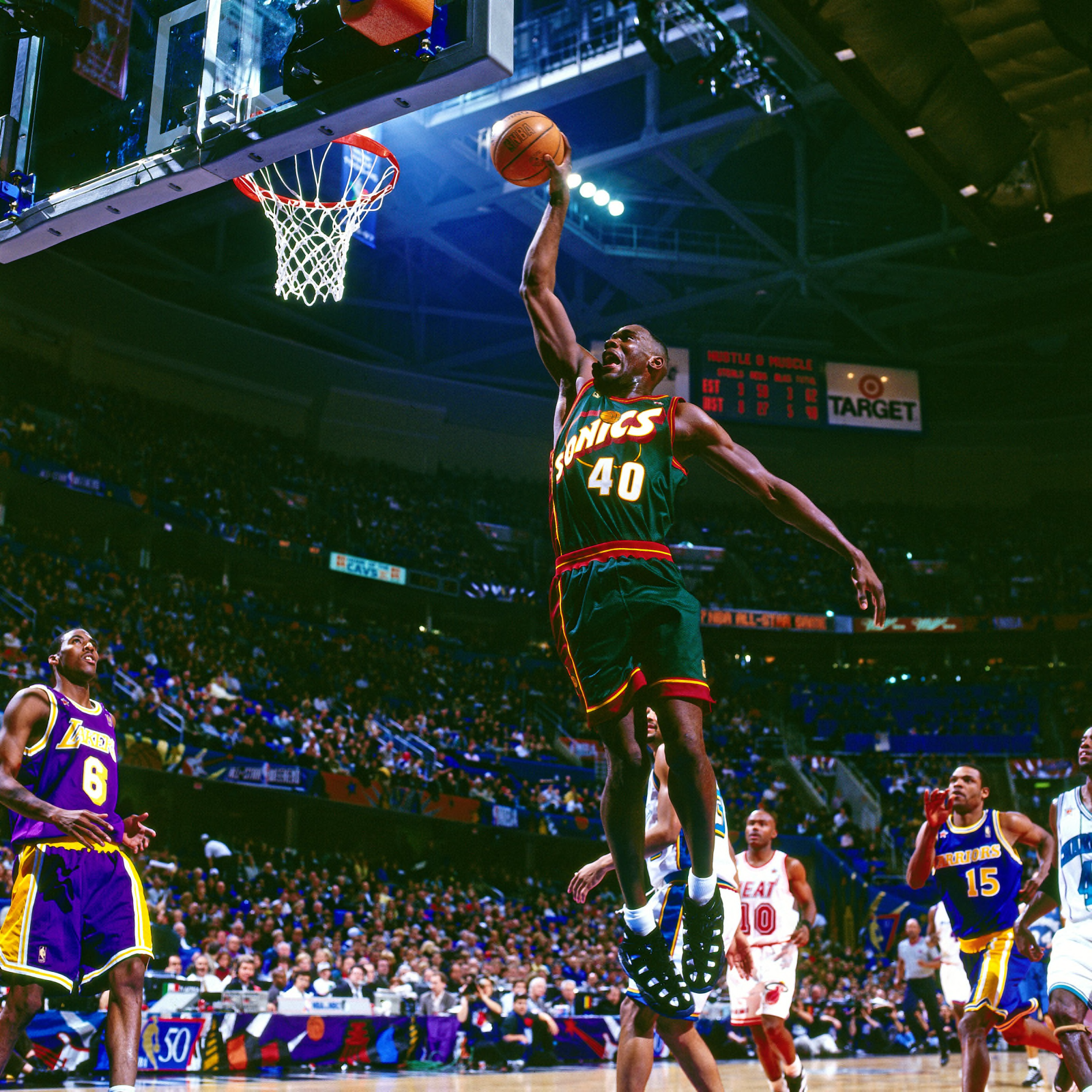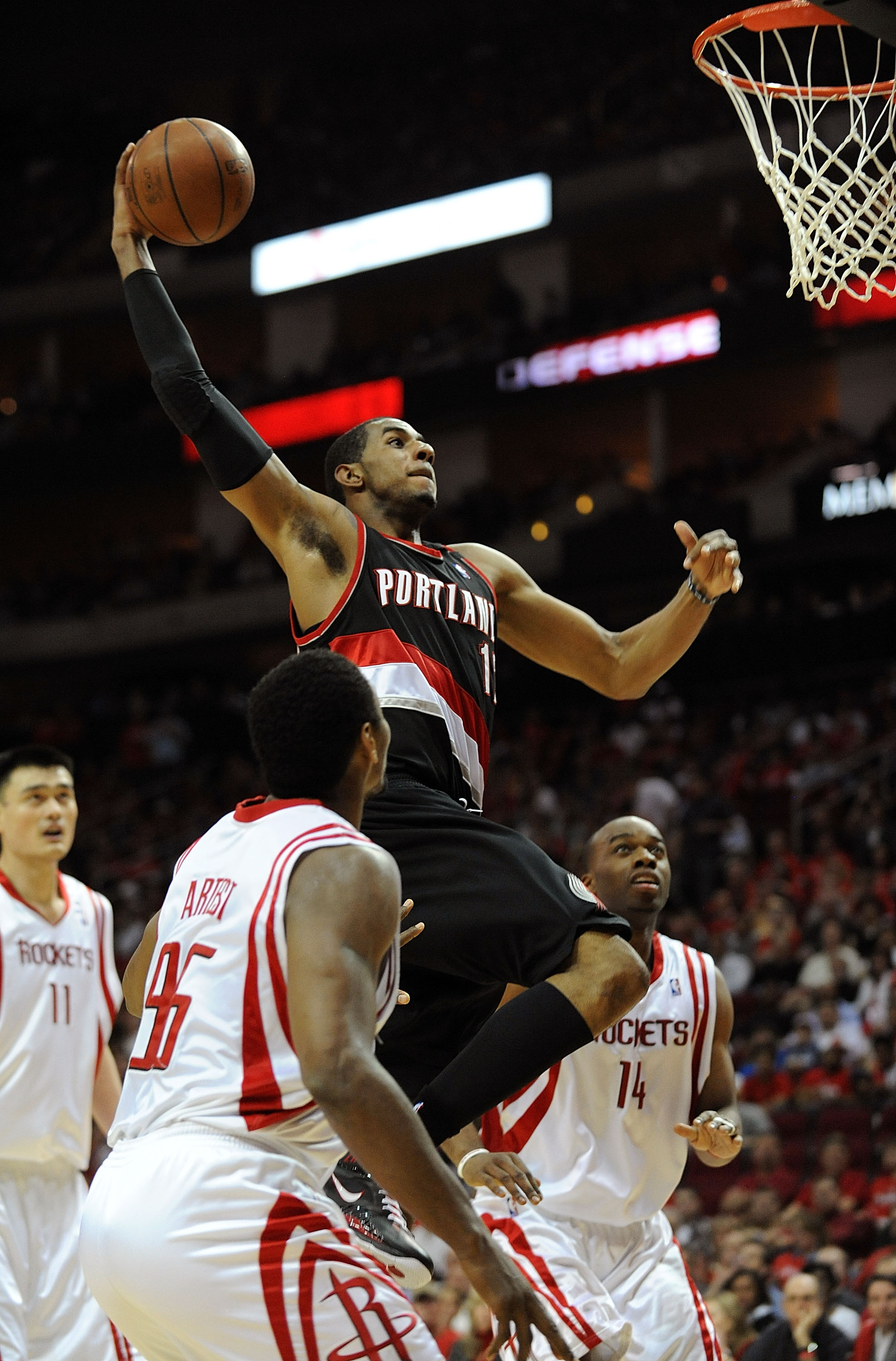Over the years, I have spent a lot of time trying to create the perfect statistical ranking of NBA players throughout history, and I have shared my overall all-time rankings twice before on this blog. There have always been some issues with players ranked higher or lower than the general consensus believes, and I am always trying to find ways to improve my algorithm to make the final product feel closer to the reality we see with our eyes. I am not going to claim that this list is perfect, because there are still some that I don't completely agree with, but there are very few that I feel are not very close to where they belong. On a side note, there always seems to be some uproar over who is in or out of the top 10, and this is understandable, but there are really about 19 players who deserve consideration to be in the top 10, so barely half of them can make it at this point, so some who feel like top 10 players just aren't going to be there.
In my latest update, I have made several tweaks that I believe have had a very positive impact on the overall rankings. In previous versions, players were compared to the average starter during a particular season, but now I have included all data from all players, and players are now compared to the league average in each statistical category in each season. Also, rather than punishing players for being below average in certain categories, I've decided to stick to just rewarding them for categories where they are above average. Just as before, players who are above average across the board still have the advantage, but it prevents point guards for being punished for poor rebounding, and allows players who are extraordinary at one thing to still have a chance to make this list, and there are at least a couple of examples of that this time.
I have also decided to include ABA data in this latest update, which was helpful especially for Rick Barry, George Gervin, Julius Erving, and Dan Issel, but also helped out some other forgotten stars. In the first season or two of the ABA, it may not have had the same talent level as the NBA, but it caught up quickly, and the players above are just a few examples of great ABA players who continued to be stars when they joined the NBA. In accordance with that, when I talk about all-time statistical ranks, I will be referring to combined NBA/ABA statistical leaders.
The ultimate goal in sports is to win a championship, so playoff data is also included, and players' points were adjusted for series that were won without going the full possible length, to avoid punishing players for something that should be a positive. Players on the championship team are also given a bonus equal to an extra series, because otherwise there would be no difference between winning and losing in the NBA Finals. And while I am on the subject of titles, a player's record in the NBA Finals is not a valid statistic. The goal in every season is to win a championship, so only counting seasons in which a player reached the Finals is incorrect. Michael Jordan did not go 6-0, he went 6-9, and Bill Russell did not go 11-1, he went 11-2. Obviously, the more championships the better, and the better the performance and the deeper the run in the playoffs the better as well.
Now, on to a few random statistics about the players on this list. Out of the 100 players, 45 are guards and 55 are frontcourt players. 16 out of the 100 are active in the league right now, which is a higher percentage than my baseball rankings but lower than my NFL QB rankings. The college with the most players in these rankings is Kentucky, with 6, followed by North Carolina and Georgetown with 4 each.
96 of the 100 players have played in the Conference Finals at least once in their career, 84 have played in the NBA Finals, including 49 of the top 50, and 66 have won at least one championship. 68 of the 83 total MVP winners from both leagues are included, and 48 of the 62 Finals MVP's, along with 32 of the 88 Rookies of the Year. There are also 20 former #1 picks represented, counting those who were territorial picks like Wilt Chamberlain in the early days of the league, and also 3 players who were not drafted into the NBA.
Here is the breakdown by primary franchise, with with total who every played for that franchise in parentheses:
Celtics - 11 (21)
Lakers - 8 (19)
Spurs - 6 (17)
76ers/Nationals - 5 (13)
Pistons - 5 (10)
Thunder/Sonics - 5 (10)
Trail Blazers - 5 (10)
Warriors - 5 (9)
Nuggets - 4 (11)
Hawks - 4 (11)
Suns - 4 (10)
Pacers - 4 (7)
Jazz - 4 (5)
Rockets - 3 (18)
Wizards/Bullets - 3 (14)
Bucks - 3 (11)
Nets - 2 (17)
Clippers/Braves - 2 (12)
Knicks - 2 (12)
Heat - 2 (10)
Bulls - 2 (10)
Cavaliers - 2 (10)
Magic - 2 (9)
Kings/Royals - 2 (5)
Colonels (ABA) - 2 (3)
Mavericks - 1 (12)
Timberwolves - 1 (6)
Pelicans - 1 (3)
Raptors - 0 (7)
Hornets - 0 (4)
Grizzlies - 0 (3)
As I announce each of the 100 countdown-style over the next several months, I will add them to the bottom of this post with a link to their post and their position, main team, and main decade.
2022 Update
2023 Update
101-150. Honorable Mention
100. Adrian Dantley - SF - UTA - 1980s
99. Bill Sharman - SG - BOS - 1950s
98. LaMarcus Aldridge - PF - POR - 2010s
97. Mel Daniels - C - IND - 1970s
96. Andre Miller - PG - DEN - 2000s
95. Shawn Kemp - PF - SEA - 1990s
94. Walter Davis - SG - PHX - 1980s
93. Draymond Green - PF - GSW - 2010s
92. Vince Carter - SG - NJN - 2000s
91. Bob Lanier - C - DET - 1970s
90. Amar'e Stoudemire - PF - PHX - 2000s
89. Wes Unseld - C - WAS - 1970s
88. John Wall - PG - WAS - 2010s
87. Gus Williams - PG - SEA - 1980s
86. Dennis Rodman - PF - DET - 1990s
85. Tom Heinsohn - PF - BOS - 1960s
84. Rod Strickland - PG - POR - 1990s
83. Cliff Hagan - SF - STL - 1960s
82. Walt Frazier - PG - NYK - 1970s
81. Ray Allen - SG - MIL - 2000s
80. Kyrie Irving - PG - CLE - 2010s
79. Alonzo Mourning - C - MIA - 1990s
78. Terry Porter - PG - POR - 1990s
77. Dikembe Mutombo - C - ATL - 1990s
76. Anthony Davis - PF - NOP - 2010s
75. Louie Dampier - PG - KEN - 1970s
74. Tracy McGrady - SG - ORL - 2000s
73. Tim Hardaway - PG - GSW - 1990s
72. Chris Webber - PF - SAC - 2000s
71. Sam Cassell - PG - MIL - 2000s
70. Dominique Wilkins - SF - ATL - 1980s
69. Carmelo Anthony - SF - DEN - 2010s
68. Alex English - SF - DEN - 1980s
67. Kawhi Leonard - SF - SAS - 2010s
66. Maurice Cheeks - PG - PHI - 1980s
65. Deron Williams - PG - UTA - 2000s
64. Ben Wallace - C - DET - 2000s
63. Damian Lillard - PG - POR - 2010s
62. Bob McAdoo - C - BUF - 1970s
61. Sam Jones - SG - BOS - 1960s
60. Manu Ginobili - SG - SAS - 2000s
59. Reggie Miller - SG - IND - 1990s
58. Kevin McHale - PF - BOS - 1980s
57. George McGinnis - PF - IND - 1970s
56. Paul Pierce - SF - BOS - 2000s
55. Chauncey Billups - PG - DET - 2000s
54. Giannis Antetokounmpo - PF - MIL - 2020s
53. George Gervin - SG - SAS - 1970s
52. Pau Gasol - C - LAL - 2010s
51. Scottie Pippen - SF - CHI - 1990s
50. Clyde Drexler - SG - POR - 1990s
49. Mark Jackson - PG - IND - 1990s
48. Rajon Rondo - PG - BOS - 2010s
47. Kevin Johnson - PG - PHX - 1990s
46. Elvin Hayes - PF - WAS - 1970s
45. Dolph Schayes - PF - SYR - 1950s
44. Gary Payton - PG - SEA - 1990s
43. Dan Issel - C - DEN - 1970s
42. Robert Parish - C - BOS - 1980s
41. Dwight Howard - C - ORL - 2010s
40. John Havlicek - SF - BOS - 1970s
39. Bob Pettit - PF - STL - 1960s
38. Allen Iverson - SG - PHI - 2000s
37. Artis Gilmore - C - KEN - 1970s
36. Rick Barry - SF - GSW - 1970s
35. Isiah Thomas - PG - DET - 1980s
34. Patrick Ewing - C - NYK - 1990s
33. Charles Barkley - PF - PHI - 1990s
32. Elgin Baylor - SF - LAL - 1960s
31. David Robinson - C - SAS - 1990s
30. George Mikan - C - MNL - 1950s
29. Tony Parker - PG - SAS - 2010s
28. Kevin Garnett - PF - MIN - 2000s
27. James Harden - SG - HOU - 2010s
26. Dirk Nowitzki - PF - DAL - 2000s
25. Stephen Curry - PG - GSW - 2010s
24. Moses Malone - C - HOU - 1980s
23. Steve Nash - PG - PHX - 2000s
22. Dwyane Wade - SG - MIA - 2010s
21. Jason Kidd - PG - NJN - 2000s
20. Chris Paul - PG - LAC - 2010s
19. Oscar Robertson - PG - CIN - 1960s
18. Larry Bird - SF - BOS - 1980s
17. Russell Westbrook - PG - OKC - 2010s
16. Kevin Durant - SF - OKC - 2010s
15. Bob Cousy - PG - BOS - 1950s
14. Julius Erving - SF - PHI - 1970s
13. Karl Malone - PF - UTA - 1990s
12. John Stockton - PG - UTA - 1990s
11. Jerry West - PG - LAL - 1960s
10. Hakeem Olajuwon - C - HOU - 1990s
9. Kobe Bryant - SG - LAL - 2000s
8. Bill Russell - C - BOS - 1960s
7. Tim Duncan - PF - SAS - 2000s
6. Magic Johnson - PG - LAL - 1980s
5. Shaquille O'Neal - C - LAL - 2000s
4. Wilt Chamberlain - C - PHW - 1960s
3. Michael Jordan - SG - CHI - 1990s
2. Kareem Abdul-Jabbar - C - LAL - 1970s
1. LeBron James - SF - CLE - 2010s
A Few Bonus Lists:
Top 25 Regular Seasons
Top 25 Seasons - Playoffs Included
Top 25 3-Year Peaks
Top 25 5-Year Peaks
Top 25 10-Year Runs


























